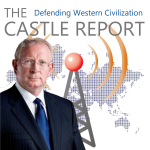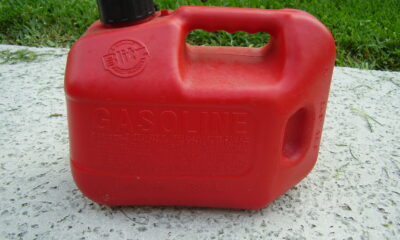Guest Columns
A Journal of the Plague Year – A Terrible Choice
The virus that struck the world presents a terrible choice: save the economy from destruction or extend a few lives for a few years each.

Hello, this is Darrell Castle with today’s Castle Report. Today I will be talking about the virus because nothing else is happening anywhere except the War on the Virus. The world’s economies shut down and the United States intentionally puts itself into negative GDP in an effort to slow the spread of the virus. It seems to be a World War against an enemy so small only an electron microscope can see it.
The virus shuts everything down
Here at the Castle Household we are in day 14 of quarantine, or day 14 of Castles held hostage. I guess that means Joan and I do not have the virus. (Although I’ve seen reports of symptoms waiting a few more days to manifest.) Nevertheless, we are grateful that we and our family, as well as our law firm staff and their families, are symptom free. We continue to work in lonely isolation, however, because Caesar has decreed that our isolation must continue for another month. The family daughter continues her symptom free isolation on a small island near the bottom of the world.
Will the virus cause more bankruptcies than fatalities?
I wonder how long this can go on without total destruction of the American economy. The answer is not that much longer as we will see in a moment. Restaurants, bars, retail shopping, churches, whole cities shutting down as the world’s economy contracts radically. Work is not being done, wages are not being earned, and things are not being made for other people to buy. It suddenly seems to have occurred to people that without revenue neither governments nor individuals can pay their bills. So perhaps the virus will bankrupt more people than it kills.
Uncertainty…
In talking with people via the Internet from around the world it seems that the world is teetering on the brink of uncertainty. What will happen to us and to our countries? No one seems to know. We do know the results of uncertainty when we have seen it in the past. The great American detective Lieutenant Columbo once said, to understand something you must understand its past. So we can look at history, when we find it in pure form, and mix in a little human nature. And hopefully, out comes reality, as well as a view of what has happened in the past.
…and lack of confidence
People accept debt and don’t mind leverage when they have confidence of future ability to service that debt. When confidence is high, people are heavily indebted since they don’t wait to buy that new car, or that new house. When people lose confidence in the future, certainty is destroyed. And they wonder:
- Will I have a job tomorrow?
- Will I lose the ability to meet the debt service that I have?
In that case, we stop spending and circle the wagons. We go into defensive mode and perhaps contemplate what default will mean for us and our families.
The virus and its grand-scale effects
The result of all this is that, according to the St. Louis Federal Reserve, second quarter unemployment could reach 32%. This would exceed the maximum under the Great Depression. It was 24.9% in 1933 at the peak of the depression. GDP will contract in the 1st quarter by as much as 30% for the first time in many years. According to TSA, airport passenger traffic was down 90% for the month of March. 3.2 million Americans applied for unemployment benefits two weeks ago, a record number many times over. But last week its even worse at 6.6 million. The previous high was 695,000 in 1982. The Dow Jones Industrial Average (DOW), which those in power like to use as a re-election measure, is down 34% peak to trough. Call it whatever you want, but I’m calling it the worst collapse of the American economy since the great depression.
How people react
People react to all this news in different ways. Some are very nonchalant hardly paying attention at all. These folks seem to believe that the reaction of most is paranoid and way out of proportion. Some people do seem to be at least border line paranoid, afraid to leave their homes to walk out in the sunshine for a few moments. Optimists say the viral infections will peak in May; pessimists say that it will be August.1 I don’t know which of those I am because I admit that I just don’t know. The response, as usual, is local depending on culture, politics, size, geography, local skills, etc.
Will the virus kill 200,000 or more people?
I do wonder sometimes if we are shutting down the world for nothing. Is the cure worse than the disease? What matters is not what I think but what the Federal government thinks, and what it will do as a result. When the Federal government portrays itself as the solver of every problem, it’s natural that the Feds should get the blame when problems go unsolved. We should know from history that World Wars cannot be fought without casualties, but the virus now reminds us. The government tells us that we can expect 200,000 to 240,000 dead before the virus is forced into unconditional surrender. Even then, it warns that it could return for a second attack when cool weather returns in the fall. Those casualties, I suppose, represent the collateral damage of war, just throwaways along the road to victory.
Government relief from the effects of the virus
What will the Federal Government do to prevent a total collapse? In conjunction with the Federal Reserve, it will infuse 6 trillion dollars into the economy. They intend using this to replace that which we’re losing. Some of that money will apparently go to small businesses. This will prevent their laying off workers. That would send them to the unemployment line where they would require government relief anyway. Eighty per cent of Americans will get a direct cash payment. This will require 560 billion of the 2.2 trillion allocated. The Federal Reserve has earmarked 3 trillion that doesn’t need Congressional approval for its own use with the banks and debt markets.
In the bond and stock markets: municipal bonds…
Bond and stock markets are backstopped with infinite cash. There is no hole deep enough to prevent the Federal Reserve from filling it with cash. The Federal Reserve, under congressional rules, is not permitted to be in the bond buying business. But who cares about the law in time of crises. Municipal bonds are in trouble as cities can no longer meet their expenses. So the Federal Reserve steps in to buy the bonds. This pushes municipal debt piles higher and higher. So next year it will require even more to keep the plates in the air.
…and corporate bonds
Corporations are also obviously in trouble. The list of failing corporations is very long. So the Federal Government has allocated hundreds of billions to bail them out, ostensibly to keep them from laying off workers. Sometimes it doesn’t work, and the Kennedy Center is exhibit number one. The Kennedy Center got 25 million to help avoid layoffs. But not a penny went to employees and many were laid off anyway.2 The Federal Reserve is prohibited from buying corporate bonds. But now it does anyway to keep the bond market from collapsing.
The virus gives us a consumption economy that cannot consume
I wonder if the Federal Reserve can make a real depression go away with phony money. It seems that we are about to find out. There were some ominous cracks in the American economy before war began against the virus. It was a very fragile economy dependent on infinite expansion of credit. Unemployment was low and the stock market was high. But much of the manufacturing base had already moved offshore, primarily to China. The last U.S. aspirin plant closed in 2002, the last penicillin plant in 2004. 97% of antibiotics used in the U.S. are made in China.
The U.S. economy is 70% consumption. We buy stuff that we consume and that is 70% of it. 70% of that is tied to service, not goods made and sold. Most of the losses in the service industries could turn out to be permanent. Those types of businesses do not build pent up demand as do the manufacturing industries.
A country without an industrial base
The U.S. buys and does not make or sell. How did the U.S. lose its industrial base, one factory at a time? The Feds are going to save us though. They are giving away so much money that it takes some 880 pages just to list it all. Special rules must apply to shovel out all the money. The Sunshine Law was lifted for the Federal Reserve, so we are not allowed to know exactly how much money is being created, and how much is going to what. Lobbyists line up to gain money and favor for their clients. Just look at how the Kennedy Center got its $25 million. That’s a nice contribution and I’m sure all the wheat farmers in Kansas are pleased to do their part for the Kennedy Center, as are the coal miners in West Virginia.
Other, darker suggestions on what to do about the virus
There are other suggestions for how to win the war against our invisible enemy than printing money we don’t have. Gordon Brown, the former Prime Minister of Great Britain, has said that we need a world government whose authority supersedes that of sovereign nations to coordinate the global response for health and economy. He suggested that the efforts to build and fund such a government should began yesterday at the G-20 summit. He was disappointed that the meeting organizers did not invite the UN Security Council to attend. Will he get what he and many others want? We’ll see.
A global crisis needs global money, our world leaders say. We need to empower the International Monetary Fund (IMF) with special power to create and distribute global money. They call this SDR’s, or Special Drawing Rights.
A digital certificate of immunity?
Bill Gates says that when we have a vaccine in a few months we need a “digital certificate” to note who has recovered and who has received the vaccine. I suspect that digital certificate will be necessary to enter any federal property, board an airplane or other public transportation and ultimately to buy gasoline, food or a housing contract. Government has already taught us it can do whatever it wants without restraint, and government alone determines what is essential.
What kind of economy do we really have? Not capitalism at all…
Government has no money to hand out; it can only print it. But Feds who hand out more money get more power, so they print and hand it out. Democrats and their followers in the media and in the polls often extol the virtues of socialism. They condemn capitalism and blame it for the problems. What they don’t understand is that what we have, and have had for many years, is not capitalism. If it were capitalism it would not be failing. For capitalism to work, one must allow corporations to fail. The bankruptcy system works quite well to repair it all.
…but fascism as Mussolini defined and practiced it
What we actually have is fascism or corporatism as defined by Benito Mussolini. Never mind the silly uniform and strutting posture for those were just the trappings. Fascism is a union between government and corporations to run a country. The corporations of a large enough scale run the country and game it for the benefit of their insiders. Then the government backstops their mistakes and gambling losses with taxpayer money. Corporate boards become revolving doors for high ranking officials both elected and bureaucratic. Everybody wins and nobody loses, as the Godfather used to say.
The virus presents a terrible choice
In conclusion, I want to tell you the terrible choice the government is facing and must make right now. Perhaps it has already made the choice; I don’t know. On the one hand we have a large group of highly vulnerable people, including diabetics, heavy smokers, heavy drinkers, and especially the very frail elderly. When positive for the virus a great many of these people die with or without ventilators. I heard a doctor in NY say that 80% of those over 80 in hospitals die with or without ventilators.
On the other side of the equation, we have an economy that’s rapidly sinking into depression, perhaps fatally. Should we start now trying to restart this economy before it’s too late? Should we continue as we are going and just try to print our way out of it knowing that Zimbabwe may lie at the end of that road?
Three months to make the choice
With the bailout funds we have bought possibly a 3-month window of opportunity. What do we do with it? That is the question. Do we sacrifice the elderly, or do we sacrifice the economy? The next month or possibly less will tell us what has been decided. If we go back to work, we have probably decided to let the young and healthy workers who pay taxes go back and build herd immunity, while the weak and elderly are on their own. If we do not go back to work, then we are risking an entire national economy into the hands of a printing press. The result could be economic catastrophic collapse with the resulting social chaos and martial law. Not a pretty picture and no easy choices just bad ones and worse ones.
Personal effects of the virus
Finally, folks, here at the Castles we endeavor not to fiddle away our time while Rome burns. We continue to work hard each day although we work at home. After 14 days of quarantine, we have declared ourselves virus free, at least covid-19 free. We continue to pray for our daughter who remains stuck on a small island on the other side of the world. There are lots of storms that ravage those islands. So we watch, and we pray for both her and her husband as well as the internet’s survival.
At least that’s the way I see it.
Until next time folks,
This is Darrell Castle.
About the image
“File:Schema unui coronavirus.png” by https://www.scientificanimations.com is licensed under CC BY-SA 4.0
Editor’s notes
1 And that does not appear to matter. Dr. Anthony Fauci, head of the National Institute of Allergy and Infectious Disease, now wants to shut Americans in until we have a vaccine. “This is inconvenient from an economic and personal standpoint, but we just have to do it.” Dr. Fauci did not address, and maybe NBC’s Today didn’t ask about, how long he was really demanding Americans wait. Which could be as long as two years.
2 That could explain why Republican Members of the House have introduced a bill to claw that $25 million back.
Darrell Castle is an attorney in Memphis, Tennessee, a former USMC Combat Officer, 2008 Vice Presidential nominee, and 2016 Presidential nominee. Darrell gives his unique analysis of current national and international events from a historical and constitutional perspective. You can subscribe to Darrell's weekly podcast at castlereport.us
-

 Civilization4 days ago
Civilization4 days agoTariffs, the Supreme Court, and the Andrew Jackson Gambit
-
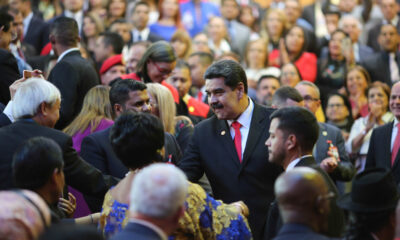
 Civilization3 days ago
Civilization3 days agoMaduro’s Capture: U.S. Foreign Policy in Latin America
-

 Civilization5 days ago
Civilization5 days agoWhy Europe’s Institutional Status Quo is Now a Security Risk
-

 Civilization4 days ago
Civilization4 days agoTrump Lashes Out at Supreme Court as Under ‘Foreign Influence’
-

 Civilization5 days ago
Civilization5 days agoSvalbard: The Other Arctic Island Flashpoint
-
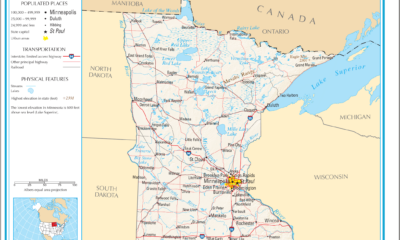
 Civilization4 days ago
Civilization4 days agoTrump Administration Led With the Wrong Agency in Minnesota
-
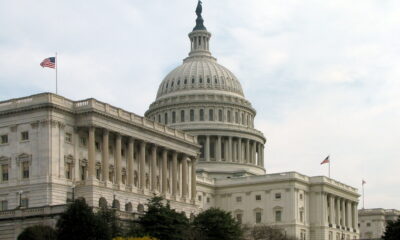
 Guest Columns3 days ago
Guest Columns3 days agoA Bipartisan Fix for the Prescription Drug Market
-
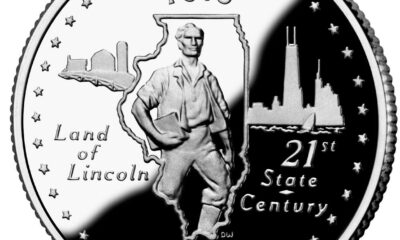
 Guest Columns2 days ago
Guest Columns2 days agoWaste of the Day: Thousands of Earmarks in Illinois State Budget


